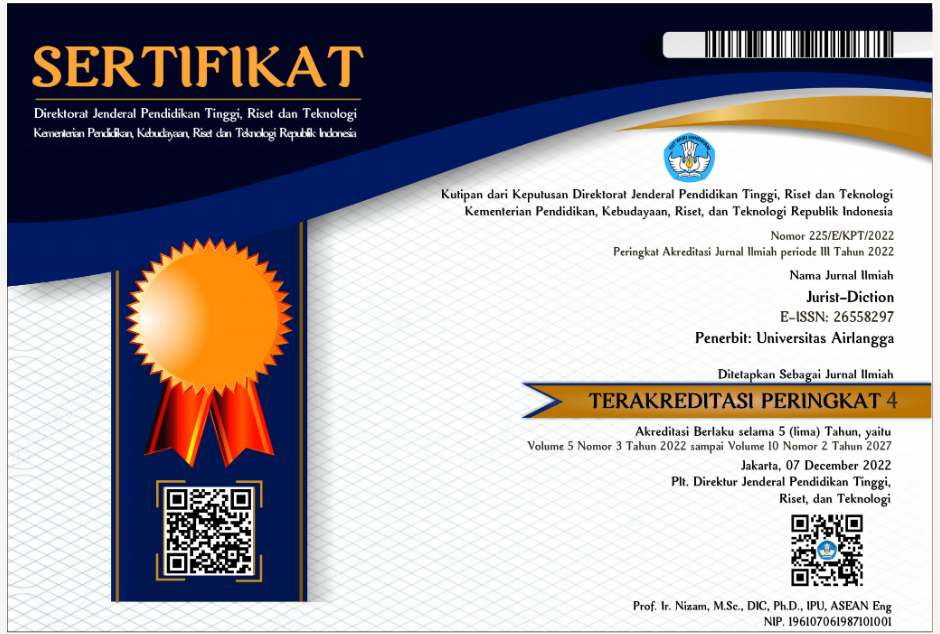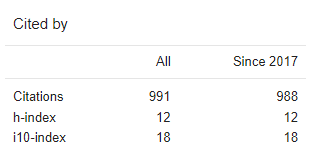Perlindungan Hak Pekerja Atas Harta Pailit Yang Berupa Jaminan Pihak Ketiga (Studi Kasus Putusan Nomor 37/PDT.SUS.GLL/2019/PN.NIAGA.JKT.PST)
Downloads
Abstract
A bankruptcy decision on a company can result in termination of employment. In bankruptcy, there are three types of creditors, namely preferred creditors, separatist creditors and concurrent creditors. Workers as preferred creditors in the law shall prioritize the distribution of wages owed. However, the position of workers is often ignored and gives priority to payment to separatist creditors. This is because separatist creditors can execute collateral objects and the proceeds are not shared with preferred creditors. Moreover, if the bankruptcy estate is in the form of collateral belong to a third party, the holder of the guarantee is the creditor. Other creditors do not receive a share because they are not entitled to collateral that belongs to a third party, which is not included in the debtor's bankruptcy estate. Workers are not entitled to third party guarantees, but workers get their rights from the board of directors. The Board of Directors is responsible for the company's debt that has not been paid by placing the money in bankrupt assets. It is the board of directors responsibility for negligence in controlling the company which resulted in bankruptcy.
Keywords: Bankruptcy; Workers; Collateral; Third Parties.
Abstrak
Putusan pailit pada perusahaan dapat berakibat adanya pemutusan hubungan kerja. Dalam kepailitan terdapat tiga jenis kreditor yakni kreditor preferen, kreditor separatis dan kreditor konkuren. Pekerja sebagai kreditor preferen dalam Undang-Undang pembagiannya diadahulukan atas upah terutang. Akan tetapi kedudukan pekerja sering dihiraukan dan lebih mengutamakan pembayaran pada kreditor separatis. Karena kreditor separatis dapat melakukan eksekusi benda jaminan dan hasilnya tidak dibagikan kepada kreditor preferen. Terlebih lagi jika harta pailit tersebut berebentuk jaminan milik pihak ketiga maka yang menguasai atas jaminan tersebut yakni kreditor pemegang. Untuk kreditor lainnya tidak mendapat pembagian karena tidak berhak atas jaminan milik pihak ketiga, yang mana bukan termasuk dari harta pailit debitor. Pekerja tidak berhak atas jaminan milik pihak ketiga tetapi pekerja mendapatkan haknya dari direksi. Direksi bertanggung jawab atas utang perusahaan yang belum dibayarkan dengan memasukkan uangnya ke harta pailit. Sebagai tanggung jawab direksi atas kelalaiannya dalam pengendalian perusahaan sampai mengakibatkan pailit.
Kata Kunci: Kepailitan; Pekerja; Jaminan; Pihak Ketiga.
Buku
Ivida Dewi Amrih dan Herowati Poesoko, Hukum Kepailitan Kedudukan dan Hak Kreditor Separatis atas Benda Jaminan Debitor Pailit (LaksBang 2016).
Rahayu Hartini, Hukum Kepailitan (UMM Press 2020).
M. Hadi Shubhan, Hukum Kepailitan Prinsip, Norma dan Praktik di Peradilan (Kencana 2008).
M. Khoidin, Hukum Jaminan (Hak-hak Jaminan, Hak Tanggungan, dan Eksekusi Hak tanggungan) (Laksbang Yustitia 2016).
Rahayu Hartini, Hukum Kepailitan (UMM Press 2020).
Sri Soewedi Masjchoen Sofwan, Hukum Jaminan di Indonesia Pokok-Pokok Hukum Jaminan Dan Jaminan Perorangan (Liberty Offeset 2011).
Jurnal
Adeline Laureen, ‘Kedudukan Upah dan Hak-Hak Lain Pekerja Pada Perusahaan Pailit Pasca Putusan Mahkamah Konstitusi Nomor 67/PUU- XI/2-13' (2018) 1 LWSA Conference Series 160.
Copyright (c) 2022 Nur Afni

This work is licensed under a Creative Commons Attribution 4.0 International License.
Jurist-Diction (P-ISSN 2721-8392, E-ISSN 2655-8297), published by Universitas Airlangga, is licensed under the Creative Commons Attribution 4.0 International License (CC BY 4.0).
This license permits users to:
- Share – copy and redistribute the material in any medium or format;
- Adapt – remix, transform, and build upon the material for any purpose, including commercial use.
These freedoms are granted under the following conditions:
Attribution – You must provide appropriate credit, include a link to the license, and indicate if any changes were made. This may be done in any reasonable manner, but not in a way that suggests the licensor endorses you or your use.
No additional restrictions – You may not apply legal terms or technological measures that restrict others from exercising the rights granted under the license.
Note: As of Volume 5, No. 1 (2022), Jurist-Diction has adopted the Creative Commons Attribution 4.0 International License (CC BY 4.0), replacing its previous license (CC BY-NC-SA).


















